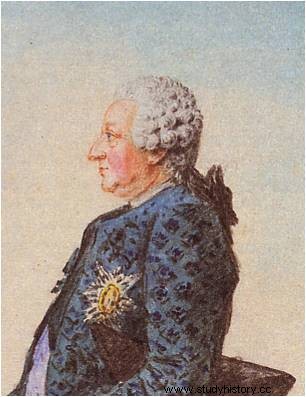GRIBEAUVAL (Jean-Baptiste Vaquette de)

(Amiens, 171.5 - Paris, 1789.) Master gunner. Enlisted in the Royal Artillery Regiment in
1735, this officer specialized in ballistic research and carried out comparative studies on the organization and firepower of various European armies.
His report concerning the Prussian artillery draws attention to him and makes him
distinguished by the Empress Marie-Thérèse, who engages him in her service in 1757 and entrusted the command of the Austrian artillery. Austrian field marshal, Gri-
beauval stood up to the army of Frederick II in 1762 in Schweidnitz for two months. Released after the end of the Seven Years' War, he returned to France where Louis XV appointed him field marshal then lieutenant general in 1765 and granted him the cord of the Grand Cross of Saint-Louis. Louis XVI made him, from 1776, an inspector general of
artillery. In these functions, the master gunner gives the full measure of his experience, differentiating the field artillery from that of the field, of which he modifies the caliber of the pieces while making them more mobile.
Thanks to these initiatives, at the end of the Ancien Régime and the beginning of the Revolution, French artillery was by far the best in Europe. It proves it to Valmy and Jemmapes and maintains this superiority during the following campaigns, providing
to the Consulate and then to the Empire firepower from which Napoleon took advantage. In the
first half of the 19th century, all European armies adapted their artillery to the standards set out by Gribeauval.
However, the work of the brilliant researcher is not limited to canons. Everything
related to armament interested him and that is why he advocated, from 1777, the forging of rifle parts using "standardized" materials.
For the time, it was a real technical revolution, given that until then
these parts were forged by hand, once k reddened metal out of the fire. Thanks to this
new technique, the rifle parts are of better quality, providing a more homogeneous armament, which improves the efficiency of the units.
